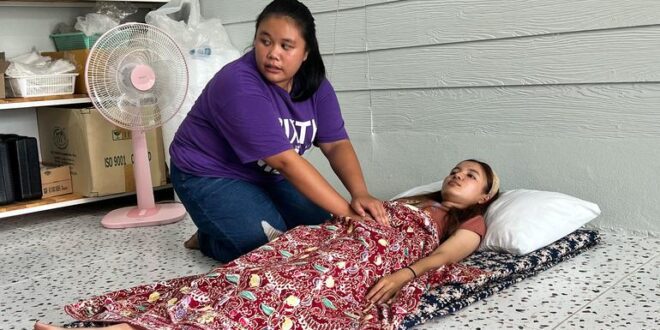Supporting Teen Mothers in Thailand
A young mother, Aorn, sits on a low wooden stool, her legs covered by a bright purple and white cloth as she hovers above burning embers. This lower-body treatment process is part of a postnatal care routine for teenage mothers in Thailand. As she prepares to lie down on a mat for a soothing massage, her six-year-old son, One, draws with crayons next to her. Aorn, now 21 years old but looking younger, is one of the estimated 47,400 teenagers between 15 and 19 who give birth each year in Thailand. Alongside many others, Aorn has faced discrimination and stigmatization due to her young pregnancy.
Aorn recalls her experience of becoming pregnant at the age of 14 after she and her boyfriend failed to use contraception. Concerned about the potential stigma and her daughter dropping out of school, Aorn’s mother persuaded her to take a herbal drink to abort the fetus. However, the attempt was unsuccessful, and Aorn gave birth to a healthy son. Despite her initial fears, Aorn expresses no regrets and is grateful for her son’s presence in her life.
Unfortunately, Aorn’s mother’s prediction came true, and Aorn stopped attending school. However, she eventually connected with a small non-governmental organization (NGO) called Khon Wai Sai, located near her hometown. With support from the organization and the UN Population Fund (UNFPA), Aorn received services, guidance, and financial grants to start a small business. She fulfilled her dream of opening a coffee shop and now works as a peer educator, providing advice to other young women who can benefit from her experience.
One of the masseuses at the center, Nan, is also a teenage mother. Nan gave birth at 16 and sought advice and support from Khon Wai Sai. Utilizing the organization’s assistance, Nan developed income-generating activities such as making compost and producing traditional Thai snacks. Both Aorn and Nan discovered opportunities for personal growth and empowerment through the support of Khon Wai Sai and UNFPA.
Efforts to Address Adolescent Pregnancy
Thailand has made significant efforts to ensure that all Thais, especially young people, have access to sexual and reproductive health services. The country’s universal health coverage system offers family planning services and various birth control options, including contraceptive pills, implants, and free condoms for young individuals. Legislation implemented in 2016 aimed to reduce adolescent pregnancy, resulting in the halving of the pregnancy rate among 15 to 19-year-olds. Thailand now strives to further decrease the rate to less than 15 births per 1,000 women.
Despite these achievements, healthcare providers often fail to adhere to the legal obligations, denying young mothers the care they require. Discrimination and stigmatization continue to pose social barriers for pregnant teenagers. Asa Torkelsson, the UNFPA Country Director for Thailand, highlights other contributing factors such as gender inequality, poverty, sexual violence, social pressures, and negative attitudes towards girls.
To address these challenges, the UNFPA works alongside the government and forms partnerships with the corporate sector. Their approach emphasizes comprehensive sexuality education, empowering girls, engaging men and boys, and ensuring access to sexual and reproductive health information and services for adolescents.
Promoting Support and Empowerment
The success stories of Aorn and Nan demonstrate the importance of providing support and empowering young mothers. Access to proper care, guidance, and financial assistance has enabled them to overcome societal obstacles and pursue their dreams.
Through their involvement with Khon Wai Sai and UNFPA-supported programs, Aorn and Nan have found opportunities to uplift themselves and help other young women facing similar challenges. They advocate for comprehensive sexual education, the elimination of discriminatory practices, and the implementation of policies that protect the rights of pregnant teenagers.
Despite Thailand’s progress in sexual and reproductive health, ongoing efforts are necessary to ensure that young women are not denied services. The government must enforce existing laws and ensure healthcare providers receive proper training. By addressing discrimination, stigma, and societal barriers, Thailand can continue its journey towards supporting and empowering all teenage mothers.
 Mind Uncharted Explore. Discover. Learn.
Mind Uncharted Explore. Discover. Learn.



